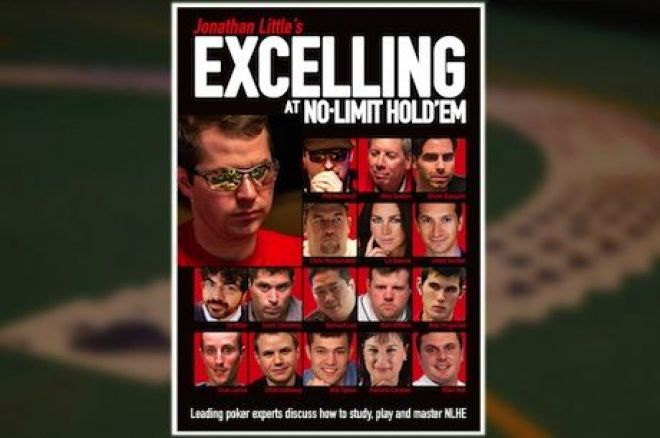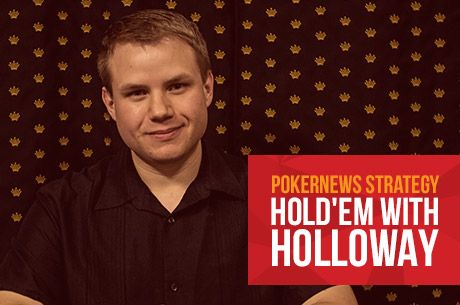Hold’em with Holloway, Vol. 21: Contributing to Jonathan Little’s New Book

During the 2014 World Series of Poker while on the dinner break of some random tournament, I struck up a conversation with Jonathan Little. I’ve always respected the World Poker Tour champ as a player, but even more so as an author, especially his Secrets of Professional Tournament Poker series. So when Little asked if I’d be interested in contributing a chapter to his next book, of course I was as giddy as a schoolgirl.
Writing my own poker book has always been a dream of mine (I’d rather write something history-related as opposed to strategy), and while I still hope to do that one day, contributing a chapter to D&B Publishing’sExcelling at No-Limit Hold’em — especially alongside a roster of high caliber players — was a very exciting opportunity.
Among the 17 players each contributing a chapter to the book are Phil Hellmuth, Mike Sexton, Olivier Busquet, Liv Boeree, Chris Moneymaker, Scott Clements, and Alex Fitzgerald. Obviously being in that company is humbling, and I was extremely honored Little felt I had something to offer.
Speaking of which, Little gave all contributors free rein to write about whatever they wanted. As I said, writing about strategy hasn’t always been my strong point (ironic, I know, as this is part of my strategy series), and I figured there were plenty of other contributors more qualified than I am to talk about equity, playing in big-money tournaments, and so on. With that in mind, I decided to go a different route and examine the evolution of poker since the so-called “poker Boom.”
I did this by choosing several transformations that have occurred over the years, and offered hands I felt were demonstrative of the following concepts/topics:
- Outdated Poker Adages
- Bigger Buy-Ins and Deeper Stacks
- A Shift in Poker’s Predominant Strategy
- Preflop Aggression
- Check-Raising My Way to a WSOP Bracelet
- Incorporating the Float
- Getting Away from Big Hands
- Tells vs. Range
- More Opportunities to Learn
Most of those topics are anchored by poker hands I either witnessed (e.g., Joe Tehan’s epic shove with 4♥2♦ in an Epic Poker event) or played when I won Event #1: $500 Casino Employees at the 2013 World Series of Poker. In other words, I tried to cover a broad range of changes while infusing them with my own personal experiences. It was a lot of work, but in the end I was happy with how it turned out.
Here’s a short sample from my chapter, which begins the section titled Lessons from the Past — Outdated Poker Adages:
The poker boom sparked a poker renaissance. Tens of thousands of players were introduced to the game, and all were eager to learn its intricacies. Books and articles of the day advocated a certain playing style that included “tight is right” and “if you can’t raise, don’t play.” Such words of wisdom served players well for many years, but as the game evolved, many of these adages have fallen by the wayside.
Unfortunately (or fortunately, depending on how you look at it), many of these maxims are still the foundation of many players’ games. If that’s you, don’t feel guilty. From 2005-2010, my poker game remained largely unchanged and was underpinned by principles I’d learned years before. I was winning at that time, so there was no need to change.
Unfortunately players got better and the game began to transform. Simply put, players were evolving and I wasn’t adapting. I tried the same old tricks, which were no longer working, so of course, I began to lose. An extended downswing will make anyone reexamine their game, and I was no exception. Believe me, it wasn’t easy to admit that I was no longer good at a game I loved, but once I did, I resolved to overhaul my strategy so that I could compete and win.
Below are three strategies that were once the norm in poker. Some still have a place in the game, but others are hopelessly outdated. So, if you’re playing with these things in mind, it’s probably time to change your game.
Tight is Right — It wasn’t long ago when playing tight in tournaments was the thing to do. Everyone would wait patiently for a big hand, but then someone came along and realized they could amass tons of chips by stealing the blinds and antes. Before long, others picked up on it, and an “aggression race” was on.
I’ll talk more about preflop aggression later in this chapter, but for now, know that playing too tight will open the door for players to take advantage of you. Don’t get me wrong, there is a time and place for “tight is right.” It should be a gear you use on occasion, not a playing style in itself.
Open-raise for 3-4x the Big Blind — Over the years, the standard amount to open-raise preflop has declined; in fact, many players now open for the absolute minimum. For example, if the blinds were 500/1,000 then the raiser would come in for 2,000. That worked for a while as players were hesitant to protect their blinds, but after players began to defend with a wider range of hands, the standard raise worked its way up 2.25-3x the size of big blind.
Never Min-Raise / Respect the Raiser — Min-raising used to be a rare thing in no-limit hold’em mainly because it was perceived as a weak move. However, when players realized that oftentimes they could win a pot with minimal investment, the min-raise came into fashion. As a result, the power of the raise was diluted. Players only used to raise with premium cards, but now it seems any two cards will do.
That’s just a little taste of what my chapter has to offer. In addition, you’ll find a huge range of topics from the other contributors including satellite strategy, game theory optimal strategies, and moving up in stakes and staying there, just to name a few.
Excelling at No-Limit Hold’em is set to publish on June 13, which coincides with the 2015 WSOP. From what I understand, there will be some sort of launch party in Vegas, and I hope those at the Rio will find time to come. Meanwhile, you can preorder the 500-page book by clicking here.
Get all the latest PokerNews updates on your social media outlets. Follow us on Twitter and find us on both Facebook and Google+!
In this Series
- 1 Hold’em with Holloway, Vol. 1: Making Reads and Trusting Them
- 2 Hold’em with Holloway, Vol. 2: Playing in Poker Charity Events
- 3 Hold’em with Holloway, Vol. 3: Throttle Back Before You End Up Punting
- 4 Hold’em with Holloway, Vol. 4: Punish the Satellite Bubble
- 5 Hold’em with Holloway, Vol. 5: What is Proper Accumulator Strategy?
- 6 Hold’em with Holloway, Vol. 6: A Chip and a Chair Story with “SirWatts”
- 7 Hold’em with Holloway, Vol. 7: 15 Things About Poker I Wish I’d Known Sooner
- 8 Hold’em with Holloway, Vol. 8: Examining the Largest Overlay in Poker History
- 9 Hold’em with Holloway, Vol. 9: Differences Between Rebuys and Reentries
- 10 Hold’em with Holloway, Vol. 10: Five Must-Read Poker Books of 2014
- 11 Hold’em with Holloway, Vol. 11: When Will You Finally Break Through?
- 12 Hold’em with Holloway, Vol. 12: Dealing with a Target on Your Back
- 13 Hold’em with Holloway, Vol. 13: Knowing When to Call It Quits
- 14 Hold’em with Holloway, Vol. 14: Embarking on a Year-Long Weight Loss Journey
- 15 Hold’em with Holloway, Vol. 15: Navigating Multiple Decision Points in a Poker Hand
- 16 Hold’em with Holloway, Vol. 16: Chris Moorman Tells Me How Badly I Play Poker
- 17 Hold’em with Holloway, Vol. 17: Richard “nutsinho” Lyndaker on Getting It in Marginal
- 18 Hold’em with Holloway, Vol. 18: Getting Inside the Head of Poker Pro Brian Rast
- 19 Hold’em with Holloway, Vol. 19: Stupid Calls & Lucky Draws in MSPT WI Championship
- 20 Hold’em with Holloway, Vol. 20: Talking Ante-Only Strategy with Greg “FossilMan” Raymer
- 21 Hold’em with Holloway, Vol. 21: Contributing to Jonathan Little’s New Book
- 22 Hold’em with Holloway, Vol. 22: Consequences of Acting Out of Turn & Tossing in Chips
- 23 Hold’em with Holloway, Vol. 23: When It Comes to Chops, Do What’s In Your Best Interest
- 24 Hold’em with Holloway, Vol. 24: Accepting Bad Beats & Lessons in Selling Action
- 25 Hold’em with Holloway, Vol. 25: Heinz’ Ace-High Call Shows Why He's a World Champ
- 26 Hold’em with Holloway, Vol. 26: Is Keeping the Short Stack Alive Collusion?
- 27 Hold’em with Holloway, Vol. 27: Great Laydown or Bad Fold on Poker Night in America?
- 28 Hold’em with Holloway, Vol. 28: Calling Hellmuth with Jack-Deuce Offsuit
- 29 Hold’em with Holloway, Vol. 29: The Philosophy of "No-Chop" Chad
- 30 Hold’em with Holloway, Vol. 30: Preparing to Play the World Series of Poker
- 31 Hold’em with Holloway, Vol. 31: Staying on Your Grind at the World Series of Poker
- 32 Hold’em with Holloway, Vol. 32: The Perilous Decision to Call Off with Ace-Queen
- 33 Hold’em with Holloway, Vol. 33: Using Poker Skills in Reality TV Competitions
- 34 Hold’em with Holloway, Vol. 34: Esfandiari Explains How to Recover from Bad Beats
- 35 Hold’em with Holloway, Vol. 35: Tilly vs. Brunson in Super High Roller Cash Game Hand
- 36 Hold’em with Holloway, Vol 36: Unconventional Play Leads to Good WSOP Main Event Start
- 37 Hold’em with Holloway, Vol. 37: Lessons in Pot-Limit Omaha Hi-Low w/ Evan Jarvis
- 38 Hold’em with Holloway, Vol. 38: Things to Say and Do When You Bust a Poker Tournament
- 39 Hold’em with Holloway, Vol. 39: How Much Did I Have to Raise to Get You to Fold?
- 40 Hold’em with Holloway, Vol. 40: Practicing Patience in My Deep PPC Poker Tour Run
- 41 Hold’em with Holloway, Vol. 41: Analyzing a Questionable SHRPO Main Event Hand
- 42 Hold’em with Holloway, Vol. 42: Analyzing the Play of Neymar Jr. at EPT Barcelona
- 43 Hold’em with Holloway, Vol. 43: The Value of a Reliable Poker Reputation
- 44 Hold’em with Holloway, Vol. 44: John “KasinoKrime” Beauprez Rips My PLO Game Apart
- 45 Hold’em with Holloway, Vol. 45: Satellite Dilemmas -- To Call or Not to Call
- 46 Hold’em with Holloway, Vol. 46: Seiver Leverages the River in Super High Roller Bowl
- 47 Hold’em with Holloway, Vol. 47: What Untraditional Moves in Poker Might Mean
- 48 Hold’em with Holloway, Vol. 48: Thinking About the Future with Sam Grizzle
- 49 Hold’em with Holloway, Vol. 49: WCOOP Champ “Coenaldinho7” Offers Up His Biggest Hands
- 50 Hold’em with Holloway, Vol. 50: The Peril of Shoving Weak Aces
- 51 Hold’em with Holloway, Vol. 51: The Importance of Not Giving Up in Poker Tournaments
- 52 Hold’em with Holloway, Vol. 52: Does Asking “Check” Actually Constitute a Check?
- 53 Hold’em with Holloway, Vol. 53: Thomas Cannuli Impresses Even After Main Event Bustout
- 54 Hold’em with Holloway, Vol. 54: Dealers Aren’t Always Right
- 55 Hold’em with Holloway, Vol. 55: Don’t Get Married to Pocket Aces
- 56 Hold’em with Holloway, Vol. 56: Bazeley’s Survival Instinct Leads to Continued Success
- 57 Hold’em with Holloway, Vol. 57: Playing “Deuces Wild” on the European Poker Tour
- 58 Hold’em with Holloway, Vol. 58: The Wildest Hand in European Poker Tour History
- 59 Hold’em with Holloway, Vol. 59: Death, Zombies & Spending Time w/Phil Hellmuth
- 60 Hold’em with Holloway, Vol. 60: How the Unstoppable Fedor Holz Managed to Win Again
- 61 Hold’em with Holloway, Vol. 61: Lessons To Be Learned When You Hit the Big Stage
- 62 Hold’em with Holloway, Vol. 62: Steve O’Dwyer Explains the “Oreo Cookie Tell”
- 63 Hold’em with Holloway, Vol. 63: What Would Happen to a Chip Stack If a November Niner Died?
- 64 Hold’em with Holloway, Vol. 64: Forgetting One Chip -- Should It Still Be an All-In Bet?
- 65 Hold’em with Holloway, Vol. 65: Todd “sharkslayerrr” Breyfogle on Bankroll Management
- 66 Hold’em with Holloway, Vol. 66: Cash Game Pro Daniel Arfin Offers Sound Bankroll Advice
- 67 Hold’em with Holloway, Vol. 67: Honeyman Plays Kings to Keep in Opponent’s Bluff Range
- 68 Hold’em with Holloway, Vol. 68: Why Do I Even Bother Drinking at the Poker Table?
- 69 Hold’em with Holloway, Vol. 69: Is Your Favorite Poker Pro Left- or Right-Handed?
- 70 Hold’em with Holloway, Vol. 70: In Order to Live You Have to Be Willing to Die
- 71 Hold’em with Holloway, Vol. 71: How to Amass a Big Stack Early in a Poker Tournament
- 72 Hold’em with Holloway, Vol. 72: Answering User-Submitted Poker Scenarios
- 73 Hold’em with Holloway, Vol. 73: Saying Goodbye with a Top Five List
- 74 Hold'em with Holloway, Vol. 74: We're Back, Baby!
- 75 Hold'em with Holloway, Vol. 75: Jivkov on Exploiting Capped Ranges
- 76 Hold’em with Holloway, Vol. 76: Matt Bretzfield Gets Tricky With Aces
- 77 Hold'em with Holloway, Vol. 77: Joseph Cheong Gets Crazy with a Pair of Ladies
- 78 Hold'em with Holloway, Vol. 78: Wyoming Poker Action & Wild South Dakota Hand
- 79 Hold'em with Holloway, Vol. 79: Calling Controversy at WinStar
- 80 Hold'em with Holloway, Vol. 80: Going for Value with Matt Hunt
- 81 Hold'em with Holloway, Vol. 81: Bracelet Winner Ryan Leng on Bad Call
- 82 Hold'em with Holloway, Vol. 82: Romeopro33 Recounts XL Eclipse Victory
- 83 Hold'em with Holloway, Vol. 83: Men The Master Doesn't Get Paid
- 84 Hold'em with Holloway, Vol. 84: Harman Hits Back-to-Back Miracle Turns
- 85 Hold'em with Holloway, Vol. 85: Jamie Kerstetter on Dealing with Bounties
- 86 Hold'em with Holloway, Vol. 86: Matt Stout Develops a Limp Dynamic
- 87 Hold'em with Holloway, Vol. 87: Matt Alexander Caught in Between w/ Two Red Aces
- 88 Hold'em with Holloway, Vol. 88: John Beauprez on Why He Folded a Set of Jacks
- 89 Hold'em with Holloway, Vol. 89: Alex Aqel Lets Opponent Hang Himself with Aces
- 90 Hold'em with Holloway, Vol. 90: David Peters Makes Beastly Call Against Will Givens
- 91 Hold'em with Holloway, Vol. 91: Poker Lessons from a Game of Risk
- 92 Hold'em with Holloway, Vol. 92: My Upstuck Diagnosis by the CLC Squad
- 93 Hold'em with Holloway, Vol. 93: Alex Foxen Coolers Nick Petrangelo in SHRB
- 94 Hold'em with Holloway, Vol. 94: My $25,000 PSPC Experience at 2019 PCA
- 95 Hold'em with Holloway, Vol. 95: The Equity of Leveraging Time Extensions
- 96 Hold'em with Holloway, Vol. 96: Dan O'Brien on Developing Healthy Routines
- 97 Hold'em with Holloway, Vol. 97: Big Hands From the WSOP-C Potawatomi
- 98 Hold'em with Holloway, Vol. 98: Simon Deadman Rips Apart My NLH Tourney Play
- 99 Hold'em with Holloway, Vol. 99: Shoving 10-6 Smack Dab Into Pocket Aces
- 100 Hold'em with Holloway, Vol. 100: The Revived Re-Entries Debate








